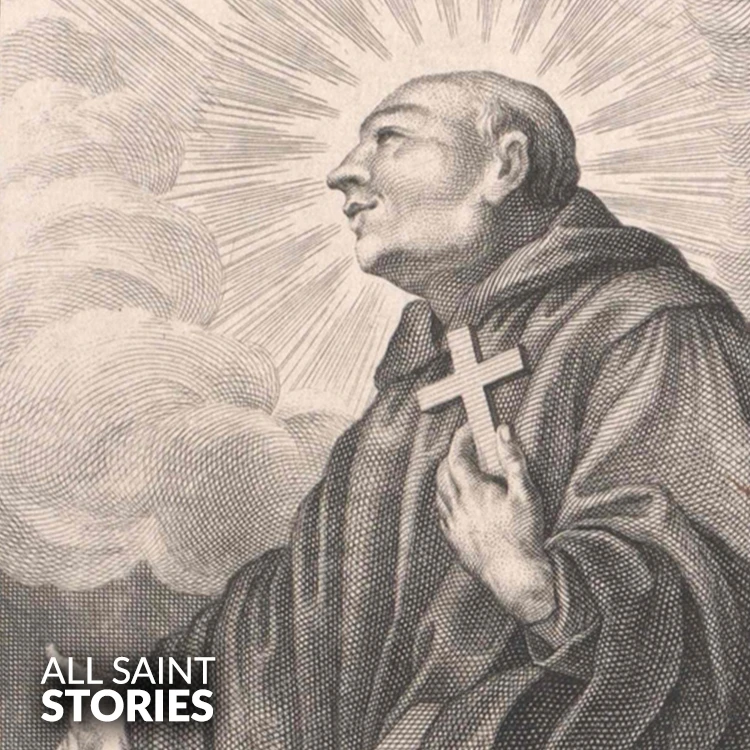"Saint Odo, faithful servant of God and founder of the Cluniac reform, we ask for your intercession. Guide us in our pursuit of holiness, humility, and dedication to prayer. Help us to live lives of peace, unity, and devotion to God, just as you did. May your example inspire us to live out the true spirit of faith, with patience and love. Through Christ our Lord. Amen."
ST. ODO OF CLUNY
ST. ODO OF CLUNY

St. Odo of Cluny, born around 878, was the second abbot of the Abbey of Cluny, France. His leadership and reforms significantly shaped the Benedictine monastic movement in the 10th century. He restored the discipline of the Cluniac Order and helped spread the Cluniac Reform across Europe. He is venerated for his devotion to monastic life and his efforts to revitalize the ideals of St. Benedict.
St. Odo of Cluny was born around 878, likely in modern-day France, and entered the monastic life at an early age. In 927, he became the second abbot of the Abbey of Cluny, a position he held until his death in 942. Odo was a key figure in the Cluniac Reform, which sought to restore the strict observance of the Rule of St. Benedict. The Abbey of Cluny had been founded by William I of Aquitaine in 910, and Odo was instrumental in ensuring that the monastic community followed the ideals set forth by St. Benedict. Under his leadership, Cluny became a beacon of spiritual discipline and a model for other monastic communities throughout Europe.
Odo emphasized the importance of liturgical prayer, communal living, and discipline in the monastic life. His reforms helped stabilize and strengthen the Cluniac Order, allowing it to grow in influence and number. By the time of his death, Cluny had become one of the most powerful and influential monastic institutions in Europe. His leadership style was marked by humility, piety, and a deep commitment to the Benedictine ideals. Through his work, he helped bring about a renaissance in monasticism that would have a lasting impact on medieval Christianity.
His reforms were not just about maintaining the outward forms of monastic life but about fostering a deep internal renewal of faith. He played a central role in spreading the Cluniac Reform across Europe, which eventually led to the establishment of numerous Cluniac monasteries. The reform was focused on liturgical purity, the education of monks, and a return to the simplicity and spiritual focus of the early Christian monastic tradition.
St. Odo died on January 1, 942, and was buried at the Abbey of Cluny. His feast day is celebrated on the anniversary of his death, January 1st. Despite not having an official canonization process during his lifetime, Odo is considered a saint by the Catholic Church due to his exceptional contributions to the monastic life and his unwavering faith. His legacy continues to inspire those devoted to the monastic life and the Rule of St. Benedict.
Video Not Found
The information on this website is compiled from various trusted sources. While we aim for accuracy, some details may be incomplete or contain discrepancies.
If you notice any errors or have additional information about this saint, please use the form on the left to share your suggestions. Your input helps us improve and maintain reliable content for everyone.
All submissions are reviewed carefully, and your personal details will remain confidential. Thank you for contributing to the accuracy and value of this resource.
Credits & Acknowledgments
- Anudina Visudhar (Malayalam) – Life of Saints for Everyday
by Msgr. Thomas Moothedan, M.A., D.D. - Saint Companions for Each Day
by A. J. M. Mausolfe & J. K. Mausolfe - US Catholic (Faith in Real Life) – Informational articles
- Wikipedia – General reference content and images
- Anastpaul.com – Saint images and reflections
- Pravachaka Sabdam (Malayalam) – Saint-related content and insights
We sincerely thank these authors and platforms for their valuable contributions. If we have unintentionally missed any attribution, please notify us, and we will make the correction promptly.
If you have any suggestion about ST. ODO OF CLUNY
Your suggestion will help improve the information about this saint. Your details will not be disclosed anywhere.
© 2026 Copyright @ www.allsaintstories.com





 English
English
 Italian
Italian
 French
French
 Spanish
Spanish
 Malayalam
Malayalam
 Russian
Russian
 Korean
Korean
 Sinhala
Sinhala
 Japanese
Japanese
 Arabic
Arabic
 Portuguese
Portuguese
 Bantu
Bantu
 Greek
Greek
 German
German
 Dutch
Dutch
 Filipino
Filipino